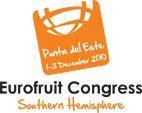
Over 220 delegates from 21 countries came together at the Conrad Hotel in Uruguay’s exclusive tourist resort of Punta del Este on 1-3 December to discuss the latest trends and market developments influencing the region’s fresh produce business at Eurofruit Congress Southern Hemisphere.
Opening the event, Uruguay's Minister of Agriculture Tabaré Aguerre said the nation has a wide range of opportunities to tap into during the coming years thanks to its many competitive advantages and ability to supply food of the quality demanded by the world’s markets.
Horacio Ozer Ami, chairman of the Uruguayan Union of Fresh Produce Growers and Exporters (Upefruy) added that the Uruguayan fruit industry has undergone a transformation in the last 10 years, illustrated by the country’s more diverse produce offer and market presence.
The first conference sessions focused on cost cutting and competitiveness, as delegates heard from Mauro Suazo, head of business development at Damco International, who explained that one of the fastest ways to increase profitability is to deliver produce directly to retailers and wholesalers through logistics solutions like the newly launched Damco Fresh Produce Direct service.
Increasingly significant issues such as environmental responsibility were also high on the agenda, with Shelly Fuller from Climate Fruit & Wine in South Africa noting that reducing energy usage is now necessary in the face of climate change, retailer pressure and rising business costs.
Elsewhere, conference highlights included talks on the anticipated opening of the US market to Uruguayan citrus next year. Phil ‘Rock’ Gumpert (Tom Lange Group) explained that despite the weaker dollar and slow economic recovery there are still opportunities (particularly for mandarins) provided Uruguayan exporters satisfy market requirements, especially regarding food safety. His comments were backed up by Stuart Evans of DNE World Fruit Sales, who noted that food safety, consistent quality and reliable volume are essential in the US where there is little flexibility.
The session looking exclusively at the berry business sparked an energetic debate among delegates as John Gray from Angus Soft Fruits and Andrés Armstrong of the Chilean Blueberry Committee explained that in spite of slowing market growth there is still potential to expand blueberry sales during the winter in the UK and the US, as well as new outlets such as China, India and Korea.
The congress concluded with an interesting insight into the marketing alternatives for Southern Hemisphere exporters in non-traditional destinations. Lantao’s John Wang and Jim Provost encouraged delegates to develop close relationships with their buyers and markets, while Behnam Arjomandi of the Marhaba Trading Group in Dubai said the Middle Eastern custom of eating fruit after every meal means consumption remains strong in the region. And in Russia, JFC’s import manager Dmitry Gerasimov revealed that his company plans to double imports in the next three years as well as open up 10 additional distribution terminals to satisfy demand in emerging “second cities” across the country.
Stay up to date with information about next year's event, event testimonials and market news by visiting www.eurofruitcongress.com/sh



